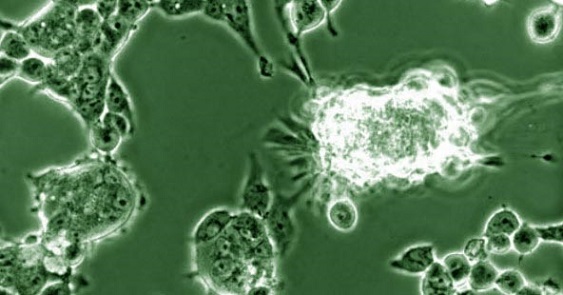SARS-CoV-2 nucleocapsid protein prevents viral degradation by disrupting nonsense-mediated mRNA decay
Nikhil Prasad Fact checked by:Thailand Medical News Team Jul 17, 2024 1 year, 7 months, 13 hours, 46 minutes ago
COVID-19 News: SARS-CoV-2 Protein Hinders Human Cellular Defense Mechanism
Researchers from the Freie Universität Berlin-Germany and the University of Cologne-Germany have made a significant discovery about the SARS-CoV-2 virus that causes COVID-19. Their findings reveal how a protein in the virus interacts with human cell mechanisms, potentially aiding the virus in evading the body's immune defenses. This
COVID-19 News report will explore the intricate details of their study and its implications.
 SARS-CoV-2 nucleocapsid protein prevents viral degradation by disrupting nonsense-mediated mRNA decay
Key Findings
Interaction with Human Cellular Machinery
SARS-CoV-2 nucleocapsid protein prevents viral degradation by disrupting nonsense-mediated mRNA decay
Key Findings
Interaction with Human Cellular Machinery
The SARS-CoV-2 virus, like other coronaviruses, has a complex RNA genome that encodes several proteins. One of these proteins, the Nucleocapsid (N) protein, is crucial for packaging the viral RNA. The researchers discovered that this N-protein interacts with certain human proteins involved in nonsense-mediated mRNA decay (NMD), a cellular process that typically helps degrade faulty mRNA molecules.
Using advanced biochemical and biophysical methods, the study identified that the N-protein interacts with the human proteins UPF1 and MOV10, both of which play critical roles in the NMD pathway. This interaction appears to affect the functionality of these human proteins, potentially stabilizing the viral RNA and aiding in the virus's replication and survival.
The Mechanisms Unveiled
Disrupting NMD Pathway
The NMD pathway is an essential cellular process that ensures the quality control of mRNA. It degrades mRNAs that contain errors, preventing the production of dysfunctional proteins. The study found that the SARS-CoV-2 N-protein interacts with the core NMD factors UPF1 and UPF2, disrupting their normal activity.
-UPF2 Interaction: The N-protein engages in a multipartite interaction with UPF2, binding to it and affecting its ability to stimulate UPF1's catalytic activity. This binding inhibits UPF1's ATPase and RNA unwinding activities, crucial for the NMD process.
-Inhibition of UPF1 Activity: The N-protein inhibits UPF1's activity by competing for binding to the RNA substrate. This competition reduces the efficiency of the NMD pathway, potentially allowing the viral RNA to evade degradation.
Functional Implications
The interference of the SARS-CoV-2 N-protein with the NMD pathway has significant implications for the virus's replication and the host's immune response. By inhibiting the NMD pathway, the viral RNA may be stabilized, allowing for more efficient viral replication and potentially more severe infections.
Experimental Evidence
The researchers used various experimental approaches
to uncover these interactions and their effects:
-Protein Expression and Purification: They expressed and purified different constructs of the N-protein and UPF2 to study their interactions.
-GST Pull-Down Assays: These assays helped identify which parts of the N-protein and UPF2 interact with each other.
-Isothermal Titration Calorimetry (ITC): This method quantified the binding affinity between the N-protein and UPF2, confirming the strength of their interaction.
-Fluorescence-Based Unwinding Assays: These assays measured the impact of the N-protein on UPF1's RNA unwinding activity, showing significant inhibition.
-RNA-Dependent ATPase Assays: These assays further confirmed the inhibitory effect of the N-protein on UPF1's activity.
Broader Impact on Host Cells
Interestingly, while the N-protein disrupts the NMD pathway, the study found that it does not affect the decay of host cell NMD targets significantly. This selective inhibition suggests that the N-protein might be specifically adapted to stabilize viral RNA without broadly impacting the host cell's mRNA.
Potential for Therapeutic Intervention
Understanding how the SARS-CoV-2 N-protein disrupts the NMD pathway opens new avenues for therapeutic interventions. Targeting this interaction could help develop treatments that restore the NMD pathway's functionality, enhancing the host's ability to degrade viral RNA and combat the infection.
Conclusion
This groundbreaking study from researchers at the Freie Universität Berlin and the University of Cologne highlights a critical interaction between the SARS-CoV-2 N-protein and the human NMD pathway. By interfering with this cellular mechanism, the virus can stabilize its RNA, aiding in its replication and persistence in the host.
The study findings provide valuable insights into the virus's strategies to evade the immune system and underscore the importance of continued research in this area.
The study findings were published on a preprint server and is currently being peer-reviewed.
https://www.biorxiv.org/content/10.1101/2024.07.16.603698v1
For the latest
COVID-19 News, keep on logging to Thailand Medical News.
Read Also:
https://www.thailandmedical.news/news/to-evade-the-immune-system-and-antibodies-sars-cov-2-rbd-switches-to-the-down-conformation
https://www.thailandmedical.news/news/sars-cov-2-uses-phase-separation-to-evade-immune-defenses-new-insights-and-potential-treatments
